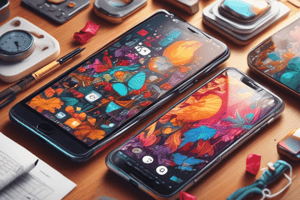Podcast
Questions and Answers
Which type of mobile app offers the best performance and full access to device features like the camera and GPS?
Which type of mobile app offers the best performance and full access to device features like the camera and GPS?
- Progressive Web Apps
- Hybrid apps
- Native apps (correct)
- Web apps
A development team is deciding between native and hybrid app development. What is a primary trade-off they should consider?
A development team is deciding between native and hybrid app development. What is a primary trade-off they should consider?
- Hybrid apps can only be distributed through third-party app stores.
- Hybrid apps offer superior performance compared to native apps.
- Native apps are easier to develop but have limited access to device features.
- Native apps generally offer better performance but require platform-specific development. (correct)
Which of the following is a key principle of mobile app design that focuses on creating an easily navigable interface?
Which of the following is a key principle of mobile app design that focuses on creating an easily navigable interface?
- Accessibility
- Simplicity (correct)
- Consistency
- Clarity
Why is it important for a mobile app to provide feedback to users after they perform an action?
Why is it important for a mobile app to provide feedback to users after they perform an action?
What is the primary purpose of User Acceptance Testing (UAT) in mobile app development?
What is the primary purpose of User Acceptance Testing (UAT) in mobile app development?
Which type of mobile app testing focuses on evaluating the performance of the app under various conditions, such as high user load or low network bandwidth?
Which type of mobile app testing focuses on evaluating the performance of the app under various conditions, such as high user load or low network bandwidth?
A company is launching a new mobile app. Which of the following strategies would directly contribute to App Store Optimization (ASO)?
A company is launching a new mobile app. Which of the following strategies would directly contribute to App Store Optimization (ASO)?
What is the main goal of mobile app analytics?
What is the main goal of mobile app analytics?
Which mobile app monetization strategy involves offering a basic version of the app for free while providing an option to upgrade to a paid version with additional features?
Which mobile app monetization strategy involves offering a basic version of the app for free while providing an option to upgrade to a paid version with additional features?
Why is data encryption a crucial aspect of mobile app security?
Why is data encryption a crucial aspect of mobile app security?
Which emerging mobile app trend involves overlaying digital content onto the real world, enhancing the user's perception and interaction?
Which emerging mobile app trend involves overlaying digital content onto the real world, enhancing the user's perception and interaction?
A mobile app collects user data. What security practice is essential to prevent injection attacks?
A mobile app collects user data. What security practice is essential to prevent injection attacks?
Which of the following metrics is most directly related to understanding how well a mobile app retains its user base over time?
Which of the following metrics is most directly related to understanding how well a mobile app retains its user base over time?
A mobile app developer wants to use a cross-platform framework to write code once and deploy it on both iOS and Android. Which of these is a suitable choice?
A mobile app developer wants to use a cross-platform framework to write code once and deploy it on both iOS and Android. Which of these is a suitable choice?
When designing forms for a mobile app, what is the most important consideration to ensure a positive user experience?
When designing forms for a mobile app, what is the most important consideration to ensure a positive user experience?
A mobile commerce app wants to leverage a trend that facilitates online shopping and payments. Which of the following trends should they focus on?
A mobile commerce app wants to leverage a trend that facilitates online shopping and payments. Which of the following trends should they focus on?
What role does authorization play in mobile app security?
What role does authorization play in mobile app security?
What is the significance of push notifications in enhancing the mobile app user interface (UI)?
What is the significance of push notifications in enhancing the mobile app user interface (UI)?
Which of the following actions would be considered part of a mobile app's back-end development?
Which of the following actions would be considered part of a mobile app's back-end development?
Which of the following programming languages is commonly used for native Android app development?
Which of the following programming languages is commonly used for native Android app development?
Flashcards
Mobile Apps
Mobile Apps
Software applications designed to run on mobile devices like smartphones and tablets.
Native Apps
Native Apps
Apps developed for a specific platform (iOS or Android) that are installed directly onto the device, offering the best performance.
Web Apps
Web Apps
Websites optimized for mobile devices, accessed through a browser. They don't require installation but have limited access to device features.
Hybrid Apps
Hybrid Apps
Signup and view all the flashcards
Mobile App Development
Mobile App Development
Signup and view all the flashcards
Simplicity (in App Design)
Simplicity (in App Design)
Signup and view all the flashcards
Clarity (in App Design)
Clarity (in App Design)
Signup and view all the flashcards
Consistency (in App Design)
Consistency (in App Design)
Signup and view all the flashcards
Feedback (in App Design)
Feedback (in App Design)
Signup and view all the flashcards
Accessibility (in App Design)
Accessibility (in App Design)
Signup and view all the flashcards
Unit Testing
Unit Testing
Signup and view all the flashcards
Integration Testing
Integration Testing
Signup and view all the flashcards
System Testing
System Testing
Signup and view all the flashcards
User Acceptance Testing (UAT)
User Acceptance Testing (UAT)
Signup and view all the flashcards
Performance Testing
Performance Testing
Signup and view all the flashcards
Security Testing
Security Testing
Signup and view all the flashcards
Paid Apps
Paid Apps
Signup and view all the flashcards
In-App Purchases
In-App Purchases
Signup and view all the flashcards
Subscriptions (Mobile Apps)
Subscriptions (Mobile Apps)
Signup and view all the flashcards
Advertising (Mobile Apps)
Advertising (Mobile Apps)
Signup and view all the flashcards
Study Notes
- Mobile apps are software applications designed to run on mobile devices such as smartphones and tablets
- Typically available through app stores specific to the operating system, such as the Apple App Store for iOS and the Google Play Store for Android
Types of Mobile Apps
- Native apps are developed specifically for a single platform, either iOS or Android, and installed directly onto the device
- Native apps offer the best performance and can access all device features, such as the camera, GPS, and contacts
- Web apps are accessed through a web browser and are essentially websites optimized for mobile devices
- Web apps do not require installation and can run on any device with a browser, but they may have limited access to device features
- Hybrid apps are a combination of native and web apps, built using web technologies (HTML, CSS, JavaScript) and wrapped in a native container
- Hybrid apps can access some device features, but their performance may not be as good as native apps
Mobile App Development
- Mobile app development involves creating software applications for mobile devices, including smartphones, tablets, and wearable devices
- The process involves various stages, including planning, design, development, testing, and deployment
- Mobile app developers use programming languages such as Java, Kotlin, Swift, and Objective-C, as well as cross-platform frameworks like React Native, Flutter, and Xamarin
Mobile App Design Principles
- Simplicity: Apps should have a clean and intuitive interface that is easy to navigate
- Clarity: Use clear and concise language and avoid jargon
- Consistency: Maintain a consistent look and feel throughout the app
- Feedback: Provide users with feedback to let them know that their actions are being processed
- Accessibility: Design apps that are accessible to users with disabilities
Mobile App User Interface (UI)
- Navigation: The UI should provide clear and intuitive navigation to help users find what they are looking for
- Search: Include a search function to allow users to quickly find specific content or features
- Forms: Design forms that are easy to fill out and submit
- Media: Use images, videos, and audio to enhance the user experience
- Notifications: Use push notifications to keep users engaged and informed
Mobile App User Experience (UX)
- Usability: The app should be easy to use and navigate
- Efficiency: Users should be able to accomplish their tasks quickly and easily
- Engagement: The app should be engaging and keep users coming back for more
- Satisfaction: Users should be satisfied with their overall experience using the app
- Accessibility: The app should be accessible to users with disabilities
Mobile App Testing
- Unit testing: Testing individual components or modules of the app
- Integration testing: Testing the interaction between different components or modules of the app
- System testing: Testing the entire app as a whole
- User acceptance testing (UAT): Testing the app with real users to get feedback
- Performance testing: Testing the app's performance under different conditions
- Security testing: Testing the app for vulnerabilities and security flaws
Mobile App Platforms
- iOS: Apple's mobile operating system, used on iPhones and iPads
- Android: Google's mobile operating system, used on a wide variety of devices from different manufacturers
- Windows Mobile: Microsoft's mobile operating system, used on Windows Phones and tablets
Mobile App Monetization Strategies
- Paid apps: Charging users a one-time fee to download the app
- In-app purchases: Offering additional features or content for purchase within the app
- Subscriptions: Charging users a recurring fee for access to the app or its features
- Advertising: Displaying ads within the app
- Freemium: Offering a basic version of the app for free, with the option to upgrade to a paid version with additional features
Mobile App Security
- Data encryption: Encrypting sensitive data to protect it from unauthorized access
- Secure authentication: Using strong authentication methods to verify users' identities
- Authorization: Controlling access to resources based on user roles and permissions
- Input validation: Validating user input to prevent injection attacks
- Regular security updates: Keeping the app up-to-date with the latest security patches
Mobile App Analytics
- User acquisition: Tracking how users are finding and downloading the app
- User engagement: Tracking how users are using the app and its features
- User retention: Tracking how long users are continuing to use the app
- User demographics: Tracking the age, gender, and location of users
- App performance: Tracking the app's performance, including crash rates and load times
Mobile App Marketing
- App Store Optimization (ASO): Optimizing the app's listing in the app store to improve its visibility
- Social media marketing: Promoting the app on social media platforms
- Content marketing: Creating valuable content related to the app to attract users
- Email marketing: Sending emails to potential users to promote the app
- Paid advertising: Running ads on app stores, social media platforms, and other websites
Mobile App Trends
- Artificial intelligence (AI): Using AI to personalize the user experience and automate tasks
- Augmented reality (AR): Using AR to overlay digital content onto the real world
- Internet of Things (IoT): Connecting mobile apps to IoT devices
- 5G: Using 5G to improve app performance and connectivity
- Mobile commerce: Using mobile apps to facilitate online shopping and payments
Studying That Suits You
Use AI to generate personalized quizzes and flashcards to suit your learning preferences.




